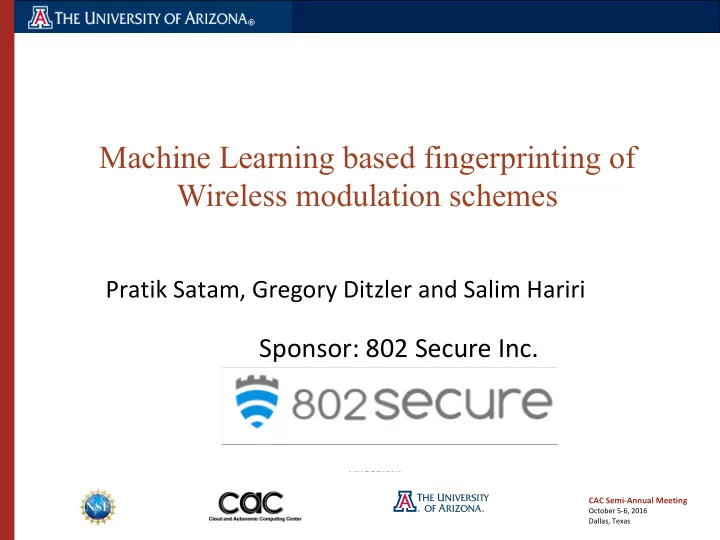

Machine Learning based fingerprinting of Wireless modulation schemes Pratik Satam, Gregory Ditzler and Salim Hariri Sponsor: 802 Secure Inc. Sponsor: MITSUBISHI CAC Semi-Annual Meeting October 5-6, 2016 Dallas, Texas
Project Overview CAC Semi-Annual Meeting October 5-6, 2016 Dallas, Texas 2
Team and Leverage p Team n 802 Secure p Kurt Gurtzmacher p Albert Pham n UA Faculty p Salim Hariri p Gregory Ditzler n UA Graduate Student p Pratik Satam p Leverage n Techniques developed during Anomaly Behavior Analysis (ABA) methodology. CAC Semi-Annual Meeting October 5-6, 2016 Dallas, Texas 3
Background IoT devices depend heavily on wireless networks n for communication. Its difficult to identity spoofed wireless n packets/frames. Fingerprinting the wireless modulation schemes n and then the hardware used to transmit these signals will give us an effective method to identify spoofed packets. CAC Semi-Annual Meeting October 5-6, 2016 Dallas, Texas 4
Project Tasks: Overview p Task 1: Collect Wireless traffic for different modulation types. n This step involves collecting data for different wireless modulations. p Task 2: Design machine learning/ neural network-based models to finger-print the modulation scheme. n This step involves developing machine learning models and neural networks that are able to identify different modulation schemes. p Task 3: Integrate the neural networks/ machine learning models into a complete system. CAC Semi-Annual Meeting October 5-6, 2016 Dallas, Texas 5
Task 1: Collect Wireless traffic for different modulation types. p Collect traffic using Software defined radios(SDR) like hackrf one and rtl-sdr. CAC Semi-Annual Meeting October 5-6, 2016 Dallas, Texas 6
Task 2-3 Building and integrating machine learning/ Neural network modules p We plan to build machine learning models and neural networks that are able to characterize modulation schemes. CAC Semi-Annual Meeting October 5-6, 2016 Dallas, Texas 7
Preliminary Analysis Results CAC Semi-Annual Meeting October 5-6, 2016 Dallas, Texas 8
Activities and outcomes p The primary goal of this project is to design, develop and implement a framework to fingerprint wireless modulations and use those fingerprints to identify the type of modulation used by the analyzed wireless signal. CAC Semi-Annual Meeting October 5-6, 2016 Dallas, Texas 9
Deliverables and benefits Deliverables • Midterm and final reports documenting research methods, progress, results, and analysis • One or two scholarly conference and/or journal publications Benefits • Capability to identify different modulation schemes using the system. • Receive software tools developed to detect different modulation schemes. CAC Semi-Annual Meeting October 5-6, 2016 Dallas, Texas 10
LIFE Form Input Please take a moment to fill out your L.I.F.E. forms. http://www.iucrc.com Select “Cloud and Autonomic Computing Center” then select “IAB” role. What do you like about this project? What would you change? (Please include all relevant feedback.) CAC Semi-Annual Meeting October 5-6, 2016 Dallas, Texas 11
Recommend
More recommend